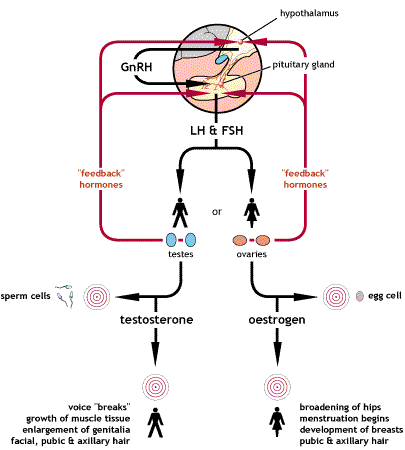
PUMPA - SMART LEARNING
எங்கள் ஆசிரியர்களுடன் 1-ஆன்-1 ஆலோசனை நேரத்தைப் பெறுங்கள். டாப்பர் ஆவதற்கு நாங்கள் பயிற்சி அளிப்போம்
Book Free DemoHormones are chemical substances that are secreted from the endocrine gland or endocrine system.
Hormones are responsible for changes in the human body at the time of puberty. They act as messengers and send signals. They are secreted in limited amounts that can cause changes in growth and development of individual, behaviour, development of organs, puberty etc.
The endocrine glands release hormones into the blood that are carried throughout the body by the bloodstream. The hormones acts on a specific tissue or organ called a target site. The target site responds according to the hormone. Thus, hormones act to regulate the target cells.
Sex hormones and the role of hormones in reproduction:
Hormones that are involved in the development and control of reproductive organs are called sex hormones.
The testes (male reproductive organ) and the ovary (female reproductive organ) secrete sex hormones testosterone and estrogen, respectively. These hormones are responsible for secondary sexual characteristics.
The sex hormones are controlled by the hormones secreted by the pituitary glands. The pituitary gland secretes hormones that induce the ova or egg to mature and the formation of sperms in the testes.

Hormonal regulations during puberty
Thus, puberty marks the start of the reproductive phase initiated by the hormones.
Role of hormones in completing the life cycle of insects and frogs:
The thyroid gland is an endocrine gland that secretes thyroid hormones - triiodothyronine (T3) and thyroxine hormone (T4). Detailed explanations about endocrine glands will be discussed in the following theories.
Insects like silk moths and animals like frogs undergo a process called metamorphosis.The insect hormones control the process of metamorphosis in insects. In frogs, the thyroid gland releases thyroxine which controls the metamorphosis process. Thyroxine in frogs is produced with the help of iodine present in the water.
Metamorphosis transforms the larva (the immature form that hatches from an egg) into an adult through different stages.
If there is a lack of or insufficient iodine in water, the tadpoles cannot be transformed into adult frogs.
Reference:
https://upload.wikimedia.org/wikipedia/commons/3/31/Flow_diagram_showing_normal_hormonal_control_of_puberty.gif